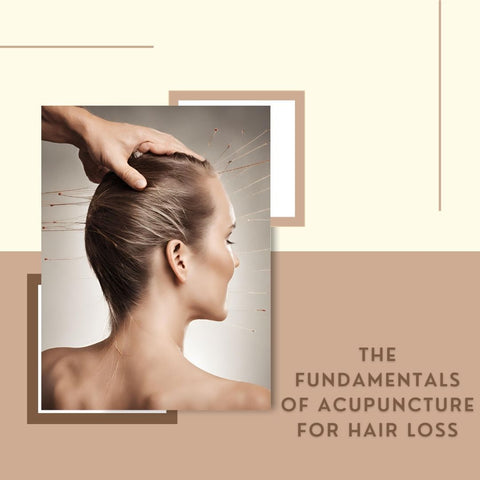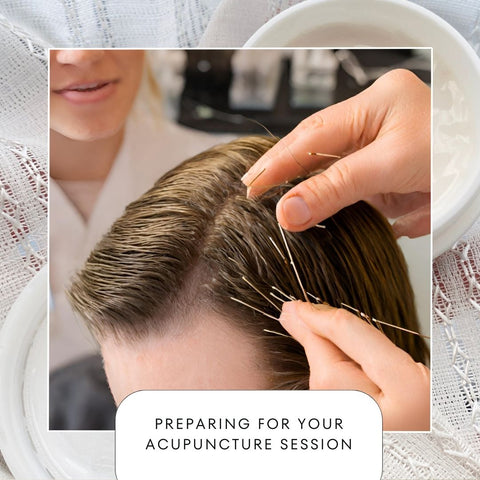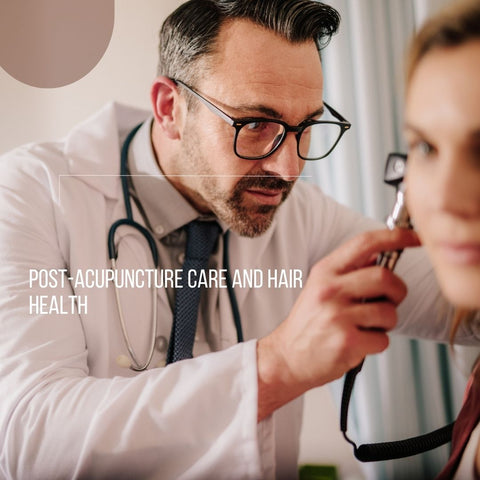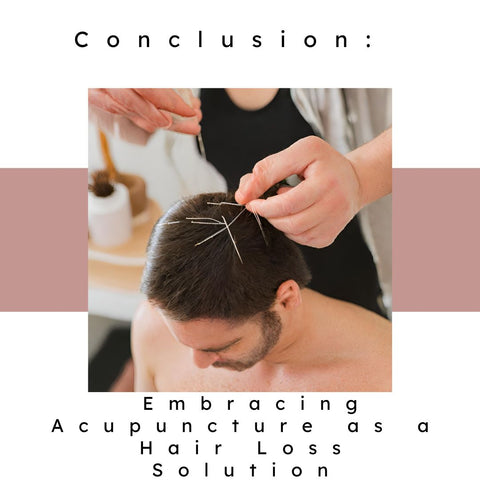Thin needles are inserted into particular body locations during the alternative medicine practice of acupuncture. Acupuncture is mainly used to treat pain, stress, and other health issues, but some supporters also think it can aid with hair growth. This blog discusses acupuncture for hair restoration and offers preparations and insights.
The Fundamentals of Acupuncture for Hair Loss

As part of Traditional Chinese Medicine (TCM), acupuncture includes the insertion of tiny needles into certain body locations to promote Qi, or energy flow (pronounced "chee"). Some acupuncturists think that acupuncture can help resolve underlying imbalances in the body that cause hair loss, even if the precise mechanisms underlying its benefits for hair loss are not well known. The principles of acupuncture for hair loss are as follows:
Principles:
-
Acupuncture is based on the idea that the body has a network of meridians or pathways through which Qi flows. Hair loss may be caused by disruptions or imbalances in these pathways.
-
Acupuncture hair loss treatment frequently involves stimulating specific acupuncture points on the body and scalp. Stimulating these points is thought to restore balance and promote hair regrowth by improving blood circulation, decreasing inflammation, and increasing Qi flow.
Before pursuing acupuncture for hair loss, always consult with a qualified acupuncturist and healthcare professional to discuss the potential benefits, risks, and expected outcomes. Also, keep in mind that everyone reacts differently and that it may take some time to noticeably improve hair regrowth.
How Acupuncture Stimulates Hair Growth
Acupuncture, an ancient Chinese healing technique, is thought to promote hair growth via a variety of mechanisms. While the precise scientific understanding of acupuncture's effects on hair growth is not fully established, here are some of the ways it is thought to stimulate hair growth:
Improved Scalp Blood Circulation:
-
Enhanced Microcirculation: Acupuncture may increase blood flow to the scalp and hair follicles. Improved circulation may deliver more nutrients and oxygen to hair follicles, benefiting their health and encouraging hair growth.
-
Blood Vessel Dilation: Inserting acupuncture needles at specific points can cause the release of vasodilators, which are substances that widen blood vessels. This dilation may increase blood flow to the scalp and hair follicles, thereby promoting hair growth.
While these mechanisms are proposed to explain how acupuncture stimulates hair growth, scientific evidence supporting the efficacy of acupuncture for hair regrowth is still limited. Individual responses to acupuncture treatments can vary, and more research is needed to determine its efficacy and the specific mechanisms involved in promoting hair growth via acupuncture. A qualified acupuncturist and healthcare professional can provide personalised insights and recommendations based on an individual's specific situation.
Identifying Acupuncture Points for Scalp Health
Identifying acupuncture points for scalp health entails understanding specific points on the body that, according to Traditional Chinese Medicine (TCM), may influence the health of the scalp and hair follicles. While acupuncture treats the entire body, some points are thought to have a more direct impact on scalp health.
It is noteworthy that although acupuncture is thought to activate these points to support scalp health, there is currently a dearth of scientific data that directly links these acupuncture points to conditions affecting the scalp. To effectively address issues related to the scalp, it is essential to consult with a licenced acupuncturist who can evaluate your health history and specific concerns. This will help determine the appropriate acupuncture points and treatment plan.
The Role of Traditional Chinese Medicine in Hair Care
The holistic approach to health taken by Traditional Chinese Medicine (TCM) takes into account how the environment, mind, and body are all interconnected. TCM emphasises preserving general health and balance in the context of hair care to encourage healthy hair development and ward off hair-related problems. The application of TCM to hair care includes understanding hair health from a holistic perspective, using herbal medicines and nutrition, treating the scalp and reducing stress, promoting emotional and mental well-being, diagnosing underlying problems, and taking preventative measures. Although TCM provides insightful advice and effective therapies to support hair health, research on scientific proof of TCM's efficacy in treating certain hair issues is still underway. A skilled TCM practitioner may offer individualised advice and treatment plans based on each patient's unique needs and problems. Combining TCM concepts with contemporary hair care techniques could result in a more all-encompassing strategy for fostering healthy hair.
Preparing for Your Acupuncture Session

To guarantee a relaxing and successful experience, there are a few measures involved in getting ready for an acupuncture treatment. Prior to your acupuncture appointment, you should think about the following important steps: do your homework, select a licenced practitioner; consult with them; communicate with them; prepare mentally; wear comfortable clothing; avoid using certain substances; follow the pre-session instructions; arrive early; and be organised. You can get the most out of your acupuncture session and make sure it's more comfortable and productive by making these preparations. For a customised and successful treatment, always be open and honest in your communication with your acupuncturist and heed their advice.
What to Expect During Acupuncture for Hair Loss
You may anticipate a thorough approach aimed at treating underlying imbalances and stimulating certain acupuncture points connected to hair health during an acupuncture session for hair loss. The following are some things to anticipate from a hair loss-focused acupuncture session: consultation and assessment; customised treatment plan; acupuncture session; relaxation and length; recommendations for post-treatment; realistic expectations; and communication and feedback. It is possible to make sure that your acupuncture treatments for hair loss are more comfortable and useful by being aware of the procedure and keeping lines of communication open with your acupuncturist. Keep in mind that every person may react differently, and getting the most out of several sessions is usually advised.
Safety and Hygiene in Acupuncture Treatment
To provide patients with a hygienic and risk-free atmosphere during acupuncture sessions, safety and cleanliness are crucial. Strict guidelines and procedures are followed by licenced acupuncturists to ensure a clean and safe treatment environment. Licenced practitioners, the use of sterile needles and equipment, a clean treatment space, personal hygiene and protective measures, patient education, screening for health concerns, and emergency readiness are some of the most important aspects of safety and hygiene in acupuncture treatments. Patients ought to have faith in the acupuncturist's attention to hygiene and safety protocols. It's crucial to discuss any safety or hygienic concerns with the practitioner or the appropriate regulatory agency.
Complementing Acupuncture with Nutritional Support
A good diet can support general health and even increase the efficacy of acupuncture treatments, such as those for hair loss or other specific conditions, when combined with acupuncture. This is how dietary assistance can work in conjunction with acupuncture:
-
Essential Nutrients: For healthy hair growth, an adequate intake of protein, iron, zinc, and selenium, as well as vitamins (such as the B-complex vitamins, vitamins A, C, D, and E), minerals, and vitamins is necessary. The health of hair follicles is maintained by a well-balanced diet high in these nutrients.
-
Omega-3 Fatty Acids: Foods high in omega-3 fatty acids, which are present in walnuts, flaxseeds, and seafood, can promote hair growth and help keep the scalp healthy.
Combining acupuncture with a healthy diet and nutrition improves overall health by potentially addressing underlying imbalances that may contribute to hair loss or other health problems. As always, seek the advice of qualified professionals to develop a personalised plan that meets your needs and complements your acupuncture treatment.
Post-Acupuncture Care and Hair Health

Following an acupuncture session, post-care measures are required to maximise the treatment's benefits for hair health and overall well-being.Here are some post-acupuncture care tips that are specifically designed to support hair health:
-
Rest and Relaxation: After the session, relax. Steer clear of strenuous exercise and heavy lifting that could put strain on your body. Make sure you receive enough sleep to aid in your body's recuperation and mending.
-
Hydration and Nutrition: Drink enough water to stay hydrated and support your body's processes, including the health of your hair follicles. Eat a well-balanced diet full of vitamins, minerals, and proteins—essential components that maintain the health of your hair.
-
Avoiding Certain Activities: Reduce your exposure to intense heat and direct sunlight since these may impact how your body reacts to acupuncture.Consume less alcohol and coffee as these drugs may interfere with sleep cycles and have negative effects on general health.
-
Gentle Hair Care: Be gentle when washing or combing your hair after acupuncture. Avoid aggressive brushing or pulling that might stress the hair follicles. Consider using gentle and natural hair care products that are less likely to irritate the scalp or cause adverse reactions.
-
Stress Management: Engage in stress-reduction techniques such as meditation, deep breathing exercises, or relaxing activities. Stress reduction has been shown to improve hair health. Identify and avoid stressors or situations that may contribute to increased stress levels.
-
Follow-Up Care and Recommendations: Follow your acupuncturist's instructions regarding after-treatment care. This could entail lifestyle modifications, food recommendations, or follow-up consultations. Following the session, observe any changes in your body, hair, or general state of wellbeing. During follow-up appointments, discuss any issues or progress with your acupuncturist.
-
Regular Acupuncture Sessions: To sustain the benefits and encourage continuous advancements in hair health, as advised by your practitioner, think about arranging frequent acupuncture appointments under your treatment plan. Talk to your acupuncturist about any changes you've noticed in your general health or hair health throughout upcoming sessions so that the treatment plan can be modified as necessary.
By adhering to these post-acupuncture care recommendations, you can uphold the efficacy of the hair health treatment and guarantee a comprehensive strategy for enhancing general wellbeing. A healthy lifestyle, balanced diet, and stress reduction techniques can supplement acupuncture's health-promoting effects on hair growth and general well-being.
Maintaining Scalp Health After Acupuncture
Maintaining scalp health after acupuncture for hair-related concerns entails ongoing care and practises that support the treatment's benefits. Following acupuncture sessions for hair problems, here are some tips for maintaining scalp health:
-
Gentle Hair Care Practices
-
Scalp Massage and Stimulating Techniques
-
Proper Nutrition and Hydration
-
Stress Management
-
Avoiding Scalp Irritants
-
Regular Follow-up and Care
-
Check for Signs of Scalp Issues
After acupuncture, maintaining scalp health requires a holistic approach that includes proper hygiene, nutrition, stress management, and ongoing care. By incorporating these practises into your routine, you can supplement the benefits of acupuncture sessions while also promoting a healthier scalp environment conducive to better hair health.
Natural Supplements to Enhance Hair Growth
Several natural supplements are believed to support hair growth and overall hair health. While individual responses may vary, here are some commonly recommended natural supplements:
-
Biotin (Vitamin B7): Biotin supports the production of keratin, a key protein in hair growth. It's known to strengthen hair and may aid in improving hair thickness and quality. Found in foods like eggs, nuts, whole grains, and in supplement form.
-
Vitamin C: Vitamin C is an antioxidant that helps in the production of collagen, necessary for hair structure. It also aids in the absorption of iron, an essential mineral for hair growth. Found in citrus fruits, berries, peppers, and in supplement form.
-
Vitamin E: Vitamin E is an antioxidant that supports scalp health by improving blood circulation. It may contribute to hair growth by maintaining a healthy scalp environment. Found in nuts, seeds, spinach, and in supplement form.
-
Iron: Iron helps red blood cells carry oxygen to cells, including hair follicles. Iron deficiency is linked to hair loss, so ensuring adequate iron levels is crucial for healthy hair growth. Found in red meat, spinach, lentils, and in supplement form (under medical guidance if deficient).
-
Zinc: Zinc plays a role in hair tissue growth and repair. It's involved in the hair follicle's growth cycle and may aid in preventing hair loss. Found in meat, shellfish, legumes, seeds, and in supplement form.
-
Omega-3 Fatty Acids: Omega-3 fatty acids nourish hair follicles and support scalp health by reducing inflammation. They're beneficial for maintaining healthy hair and potentially preventing hair loss. Found in fatty fish (salmon, mackerel), flaxseeds, chia seeds, and in supplement form.
-
Saw Palmetto: Saw palmetto extract may inhibit the enzyme that converts testosterone to dihydrotestosterone (DHT), linked to hair loss in some individuals. Available in supplement form, commonly used to support prostate health and potentially aid in preventing hair loss.
-
Horsetail Extract: Horsetail extract contains silica, which is believed to support hair growth and strengthen hair strands. Available in supplement form and often used to promote hair health.
Supplements can be part of a comprehensive approach to hair growth and health, but they should be used with caution and under supervision to ensure they are appropriate for your specific needs.
Lifestyle Adjustments for Sustained Hair Wellness
Adopting a holistic strategy that includes several lifestyle alterations to support overall health, scalp health, and healthy hair development is necessary to maintain prolonged hair wellbeing. A balanced diet and adequate hydration, scalp care techniques, stress management and good habits, frequent exercise, avoiding hair-damaging behaviours, shielding from environmental stressors, professional care and monitoring, supplements, and expert advice are some lifestyle changes that can support long-term hair wellness. It is imperative to integrate these activities with routine examinations and expert advice to resolve any underlying issues and preserve ideal hair health.
Expert Opinions and Success Stories

We can provide information about hair wellness and acupuncture based on expert opinions and general success stories, but individual success stories may differ. Expert opinions and success stories frequently highlight acupuncture's potential benefits for improving hair health:
- Expert Opinions:
-
Many TCM practitioners and acupuncturists believe in the effectiveness of acupuncture for improving overall health, including hair health. They often focus on the holistic approach of TCM, addressing internal imbalances that may contribute to hair issues.
-
While some dermatologists acknowledge the potential benefits of acupuncture in improving blood circulation to the scalp, stimulating hair follicles, and reducing stress-related hair loss, scientific evidence supporting its widespread effectiveness is still limited.
2. Success Stories and Anecdotal Evidence:
-
Some individuals report positive experiences with acupuncture for hair loss. They attribute improvements in hair thickness, reduced shedding, or overall scalp health to regular acupuncture sessions.
-
Success stories often involve a holistic approach where acupuncture is complemented with lifestyle changes, dietary adjustments, and other holistic treatments, suggesting that a comprehensive approach might yield better results.
It is critical to approach acupuncture for hair health or any other health concern with realistic expectations and in consultation with qualified healthcare professionals. Individual outcomes may vary, and success stories are frequently subjective. Seeking the advice of a licenced acupuncturist, dermatologist, or healthcare provider can provide personalised insights and recommendations tailored to a person's specific needs and conditions.
Testimonials: Real-Life Results from Aupuncture
Some people have reported positive results from acupuncture sessions aimed at addressing hair-related issues. Testimonials may include the following experiences:
-
Improved Hair Thickness: Some people claim to have noticed an increase in hair thickness or volume after having acupuncture sessions.
- Reduced Hair Shedding: Some people have reported a decrease in hair shedding or hair loss after receiving acupuncture treatments.
- Improved Scalp Health: Individuals may experience improved scalp conditions such as less itchiness, dryness in the scalp , or irritation, which may contribute to better hair health.
-
General Well-Being: Testimonials frequently highlight not only hair-related benefits, but also improvements in overall well-being, such as reduced stress and increased relaxation.
However, testimonials should be approached with caution. Personal experiences can vary greatly due to individual differences, underlying causes of hair issues, overall health, consistency of treatment, and a variety of external factors. The scientific evidence supporting the widespread effectiveness of acupuncture for hair loss or regrowth is still limited. While some studies suggest that acupuncture may have potential benefits for certain hair conditions by improving blood circulation, reducing stress, and stimulating hair follicles, more research is needed for conclusive evidence.
Professional Insights into Acupuncture for Hair Loss
Acupuncture is a TCM practise that involves inserting thin needles into specific points on the body to stimulate energy flow (Qi) and promote healing. While some anecdotal evidence and a few studies suggest that acupuncture may be beneficial for hair loss, professional opinions on its effectiveness vary:
-
Traditional Chinese Medicine (TCM) Practitioners: TCM practitioners frequently regard hair loss as a manifestation of internal imbalances. Acupuncture is thought to rebalance Qi, improve blood circulation, and address underlying body disharmonies that may contribute to hair problems. They emphasise an individualised approach in which specific acupuncture points are targeted based on a person's overall health, constitution, and the pattern of disharmony identified during diagnosis.
-
Acupuncture Practitioners and Dermatologists: Acupuncture practitioners propose that improved blood circulation to the scalp could nourish hair follicles and stimulate hair growth. Stress can be a contributing cause to some types of hair loss (such telogen effluvium or alopecia areata), which are brought on by autoimmune responses or stress. Acupuncture sessions may help relieve stress.
-
Scientific Community: Although some research points to possible advantages, there is little and conflicting scientific data to support acupuncture as a stand-alone treatment for hair loss. To ascertain the precise mechanisms of action of acupuncture and to confirm its efficacy in treating different forms of hair loss, more extensive and rigorous research is required.
-
Integrative Medicine Approach: A comprehensive approach to hair loss may include recommendations for acupuncture from some integrative medicine practitioners. This method of providing holistic treatment may include combining acupuncture with dietary adjustments, lifestyle adjustments, and other therapies.
While acupuncture has shown promise in some cases and is generally regarded as safe when performed by trained professionals, its efficacy for hair loss may vary. It is critical to approach acupuncture as a complementary or integrative treatment option alongside conventional treatments, and to consult with qualified practitioners for guidance and personalised care.
Conclusion: Embracing Acupuncture as a Hair Loss Solution

Accepting acupuncture as a hair loss treatment means appreciating its possible advantages, being aware of its limits in terms of empirical data, and viewing it as a component of an all-encompassing, holistic hair care regimen. Seeking the advice and insights of trained experts can help evaluate whether acupuncture is a suitable option for treating hair-related issues based on personal preferences and needs.









































